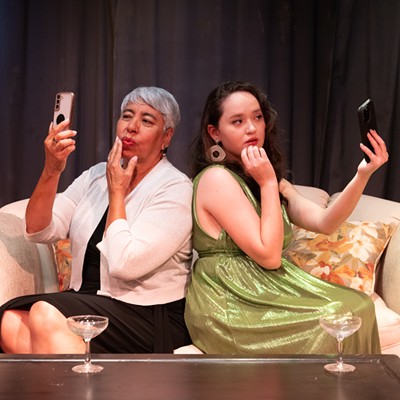Support Us
Houston's independent source of
local news and culture
account
- Welcome,
Insider - Login
- My Account
- My Newsletters
- Contribute
- Contact Us
- Sign out
Dry Land Sets the Bar for Portraying Teenage Girls On Stage
Jessica Goldman October 23, 2016 12:01PM
[
{
"name": "Related Stories / Support Us Combo",
"component": "11591218",
"insertPoint": "4",
"requiredCountToDisplay": "4"
},{
"name": "Air - Billboard - Inline Content",
"component": "11591214",
"insertPoint": "2/3",
"requiredCountToDisplay": "7"
},{
"name": "R1 - Beta - Mobile Only",
"component": "12287027",
"insertPoint": "8",
"requiredCountToDisplay": "8"
},{
"name": "Air - MediumRectangle - Inline Content - Mobile Display Size 2",
"component": "11591215",
"insertPoint": "12",
"requiredCountToDisplay": "12"
},{
"name": "Air - MediumRectangle - Inline Content - Mobile Display Size 2",
"component": "11591215",
"insertPoint": "4th",
"startingPoint": "16",
"requiredCountToDisplay": "12"
}
,{
"name": "RevContent - In Article",
"component": "12527128",
"insertPoint": "3/5",
"requiredCountToDisplay": "5"
}
]
The set up:
When is a play about teen abortion not really about abortion? Or more accurately, when is a play about teen abortion more interested in female friendships and navigating messy coming of age gymnastics than it is about actual teenage abortion?
Ruby Rae Spiegel’s thrillingly authentic Dry Land (a finalist for the 2015 Susan Smith Blackburn Prize in playwriting) does feature one hell of a disturbing abortion, but the unwanted pregnancy and its aftermath here is almost beside the point. Well, as close to almost as one can get in the case of such a dramatic and social hot topic.
Instead, Spiegel’s play which she wrote during her senior year at Yale University, draws our attention to the issues of bullying, eating disorders, female sexuality, suicide, popularity, the dynamics of teen friendships, identify versus reputation and yes, reproductive rights. And it does so with equal turns of humor, heartbreak and most importantly, an utterly genuine voice that drops us into a the world of 17-year-old girls and never once makes us question the insider view.
The execution:
“Punch me again,” says Amy (a powerhouse Skyler Sinclair), arms wide wearing nothing but a bathing suit and shorts as she stands in the swim team locker room. The demand is directed at fellow swimmer Esther (an emotionally nubile Kat Cordes) who hesitatingly does her best to put her back into the stomach punches she inflicts. There’s no talk of pregnancy or a baby, just that “it” needs to go.
It’s hard to watch, this seemingly casual way the girls go about dealing with Amy’s situation. But then unlike politicians, religious leaders or Pro Choice advocates, this pregnancy isn’t about big social justice issues or God for the girls. It’s just another thing in their complex, cusp of adulthood lives they think they must deal with on their own.
Spiegel sets the play in Florida, a state where women under the age of 18 need a parent’s permission to have an abortion, something Amy is not going to get. As for other resources, the nearby Planned Parenthood has been bombed twice now and you need a credit card and ID to buy Internet abortion pills. We flinch as the girls contemplate and dismiss other ideas, drinking detergent, douching with Clorox, falling down the stairs.
But interspersed with all this talk about ending Amy’s pregnancy, Spiegel gracefully injects heaps of regular teen banter between the girls and it’s through these conversations that we get a glimpse (and a healthy flashback) of what life is like at this age. Amy is a tough cookie with a sexual reputation to match and Esther is awkwardly eager to please and anxious to fit in. Both of these young women are trying to figure out who they want to be, yet at the same time terrified that someone will see them for who they really are. They discuss drinking and sex and boys and their future – each one trying to hide either their inexperience or cover up shameful truths. They are one minute cruel to each other and the next behave like best buddies, an attitude dance as they navigate the tricky job of adolescent female friendship.
Spiegel’s dialogue for the girls is some of the most authentic and at times authentically funny teen dialogue we could hope for. When Esther describes the kind of adult she wants to be as someone that throws parties “With like, really good cheese”, we smile remembering how we too aimed for perceived sophistication once. When asked if she enjoyed it when a boy put his mouth on her vagina, all Amy can conclude is a shrugged, “Yeah, I guess”, leaving anyone in the audience with less than memorable teenage sexual experiences to chuckle.
Both Cordes and Sinclair are more than up to the task of bringing these young women to life for us and much of their success is due to the stellar direction by Julia Traber. Without one whiff of clichéd teen angst, Traber has the girls ramp up and down their emotional octaves, flopping to the ground in disgust one minute, excitedly expressing a thought the next. They laugh and drink and argue and fantasize about the future with such authenticity that it easy to forget you’re watching two talented actors and not spying on some unknowing young women.
More impressive is Traber’s timing throughout the play. Sentences that drop off into nothing but silence feel as authentic as the quick, almost interrupting chatter that the girls engage in. Short scene by short scene goes by in this 90-minute production and we continue to be utterly enamored by the way these young women speak and interact with each other.
Three other characters populate the play with equal success. Amy’s best friend Reba (a splendid Coralee Young) has no idea of the pregnancy as she casually wanders in and out of the locker room, making Amy jump to attention. In the hierarchy of who tries to impress who, Reba is at the top of the heap allowing us even more insight into who Amy really is and why she’s so aggressive with Esther.
As a former schoolmate now attending Florida State University and host to Esther when she comes to to try out for the swim coach, Gabriel Regojo as Victor delivers cynical intensity thinly belling his own insecurities. When cynicism turns to sweetness between Victor and Esther, we are gifted with not just a wonderfully tender moment, but another layer of Esther exposed that adds to our love and concern for her character.
A janitor (Rod Todd) has very little to do in the show but his literal and metaphoric cleaning up after a horrific scene, executed exquisitely with no holds barred emotion and trauma, clears the way for the warmly calm and bittersweet final scenes of the play.
The verdict:
As a play, Dry Land, with its refusal to be a ‘one issue’ narrative and its steadfast rejection of judgmental side taking, thrills us with bluntness. This is no abortion/teenage coming of age After School special kind of story. Spiegel takes neither the cautionary tale approach nor preaches any socio/political agendas when it comes to a woman’s right to choose. Similarly, the teens in Dry Land don’t neatly fall into the stereotypical good girl/mean girl/hero/villain categories up for easy judgment. These are complex young women whose truths are at once familiar and uncomfortable and Spiegel knows that to do them justice is to let them be undefinable on their own terms.
As a production, Traber and her team have jumped into Spiegel’s domain expertly and with great attention to detail. From Claire A. “Jac” Jones’ fittingly aqua blue and pale grey toned swim team locker room to Lindsay Burns’ sartorially bang on short shorts and sweats costumes, the visuals of the production work in perfect narrative tandem. Miranda Herbert’s fight choreography takes a difficult set of situations and never shies away from making them look as real and upsetting as possible. Jon Harvey’s sound design shines with alt-rock-ish female singers, but it’s his janitor clean up music that impresses most with its incongruous shock leading to grudging amusement.
Thankfully for us, this is a solid case of when good plays happen to good creative teams.
Dry Land continues through November 5 at Studio 101, 1824 Spring. For tickets, call 832-463-0409 or visit mildredsumbrella.com. $15 to $25.
KEEP THE HOUSTON PRESS FREE...
Since we started the Houston Press, it has been defined as the free, independent voice of Houston, and we'd like to keep it that way. With local media under siege, it's more important than ever for us to rally support behind funding our local journalism. You can help by participating in our "I Support" program, allowing us to keep offering readers access to our incisive coverage of local news, food and culture with no paywalls.
Jessica Goldman was the theater critic for CBC Radio in Calgary prior to joining the Houston Press team. Her work has also appeared in American Theatre Magazine, Globe and Mail and Alberta Views. Jessica is a member of the American Theatre Critics Association.
Contact:
Jessica Goldman
Trending Arts & Culture
- Reviews For The Easily Distracted:
Deadpool & Wolverine - And Then There Were None at the Alley Leaves You Guessing Till the Very End
- Theater Magic: The Wizard of Oz at Queensbury Theatre
-
Sponsored Content From: [%sponsoredBy%]
[%title%]

Don't Miss Out
SIGN UP for the latest
arts & culture
news, free stuff and more!
Become a member to support the independent voice of Houston
and help keep the future of the Houston Press FREE
Use of this website constitutes acceptance of our
terms of use,
our cookies policy, and our
privacy policy
The Houston Press may earn a portion of sales from products & services purchased through links on our site from our
affiliate partners.
©2024
Houston Press, LP. All rights reserved.





